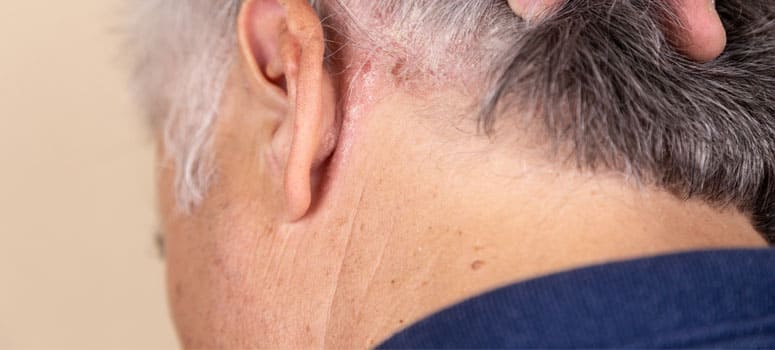Can’t keep your hands from scratching your head? Most people would consider scalp itch to be a cause of either a dirty head, bad shampoo, or dandruff. While all these three can be true and are quite common, if your itch is uncontrollable that’s a warning sign. You could be one of the 2.4% of the people worldwide to have developed Atopic Dermatitis – popularly known as Eczema.
It can flare up anywhere on the body, including your scalp. And if the itch on your head is unbearable and is turning into scaly patches, there are high chances of you suffering from Scalp Eczema.It is quite a prevalent skin condition. And despite that, it’s largely still misunderstood – sometimes even misidentified given its similarities to Psoriasis. This is another skin condition with nearly identical symptoms.
Scalp Eczema vs Scalp Psoriasis
| Eczema | Psoriasis |
| Both environmental factors and genetics could play a role in triggering the eczema rash | It is an autoimmune disease, meaning your immune system is dysfunctional and that causes the rash |
| It can lead to intense itching | It causes milder itching and soreness |
| The affected area has red skin covered with greasy-looking white to yellowish scales | The affected area has red skin covered with flakes and silvery scales |
| It could create skin flakes (dandruff) that may attach to the hair shaft | The patches may extend beyond the hairline and could appear on other parts of the body |
NOTE: Both these skin conditions not only affect the visible parts of your body but they can affect your scalp too.
The different types of Scalp Eczema
If you’re nodding in agreement with the fact that you may have developed scalp Eczema, a dermatologist is the best person to visit for your treatment. But it’s always a great idea to do some homework before you go. Here are a few types of scalp eczema that you may not be aware of.
- Seborrheic dermatitis
This type is chronic dermatitis. It occurs on the oily areas of your skin, including the scalp, face/hairline, and back. The affected skin becomes red and scaly and develops dandruff as well, which can vary in severity. If you have developed this kind of scalp eczema, your head will require continual care.
- Atopic dermatitis
This is another common type of chronic dermatitis that can affect the scalp at all ages. It can appear on the scalp and also on other parts of the body. The affected area becomes red, itchy, and dry. It can easily become infected, especially if scratched and when there is broken skin.
- Allergic Contact dermatitis
This type of dermatitis on scalp occurs when your skin reacts from contact with something in your surroundings. Everyday items that can trigger this type of dermatitis on the scalp include:
- Hair shampoos, conditioners, gels, sprays, and other hair products
- Hair dyes, perm solutions
- Bathing caps, hair nets – especially those containing rubber
- Hair clips and headgear – especially those containing rubber or nickel
Symptoms of each type of scalp eczema include:
| Seborrheic Dermatitis | Atopic Dermatitis | Contact Dermatitis |
| Scaly patches that cause yellow or white flakes (dandruff) | Extremely dry skin | Red flare-ups |
| Red flare-ups | Extreme itchiness | Hives |
| Inflammation | Red flare-ups | Blisters or sores |
| Greasy appearance | Soreness | Pain and burning |
| Burning sensation | Thick skin | Itchiness |
| Inflammation | ||
| Stiff, thick, or leathery skin |
What are the risk factors for this skin condition?
| Seborrheic Dermatitis | Atopic Dermatitis | Contact Dermatitis |
| Pre-existing medical conditions that affect the immune or nervous system | Hay fever or asthma | Regular exposure to irritants |
| Depression | Environmental factors | |
| Medications that contain interferon, lithium, or psoralen | Genetics |
When to see a doctor?
It’s always great to visit a doctor the moment you feel like your itch could be something more than normal dry skin. That’s because, if Eczema is left untreated, it could cause you a lot of pain & itching, and result in your skin bleeding as well. A doctor can help you in many ways, from identifying what’s troubling your scalp all the way to treating it.
One thing to keep in mind is that these types of skin conditions are recurrent. So self-medication is always a bad idea. Because one wrong move and things could go wrong for a long time. And also since there are a lot of similarities between Psoriasis and Eczema, you could can false diagnoses as well. So, it’s always best to consult an expert to deal with your skin condition the best way you can.
Final takeaways
Scalp Eczema rash can be uncomfortable but it is completely treatable. There are many OTC products available that can help you get rid of them. But it is always better to consult a dermatologist to understand what type of scalp Eczema you are dealing with and how to treat it the right way.














